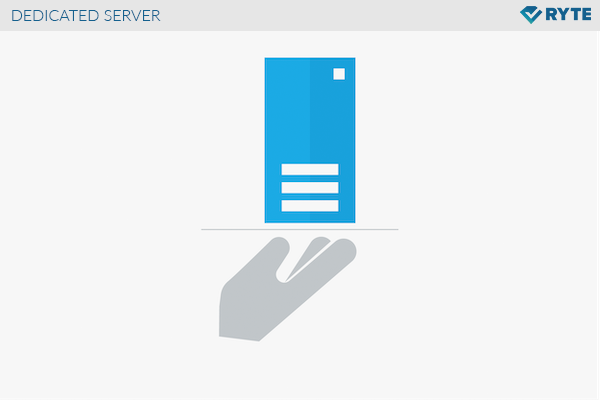Dedicated Server
The term “dedicated server” refers to a server, which is available exclusively to a single customer or website operator or to a specific task or service with its entire performance.
In contrast to a virtual server, a dedicated server or dedicated host is a physical computer with a fixed IP address that can concentrate all its computing performance, memory, and routing to just one customer or task.
Dedicated to a customer
If you rent a dedicated server, you will not be having to share the server hard drive with others and your user rights will not be restricted. This usually costs more than comparable shared hosting offers whereby the hardware of the server is not exclusively available to the customer.
Complex websites with a lot of Traffic, high volume of data, or extensive database resources such as popular web communities or eCommerce sites require a lot of hard disk space, powerful processor performance, and large memory, often more than standard web space packages with limited capacity. Operators of such websites will often choose a dedicated server. Even companies that do not want to store sensitive company data on a shared server often prefer dedicated hosting.
Dedicated to a service
Another version of a dedicated server is dedicated to just one service instead of one customer. It performs certain tasks such as the provision of print and email services or administrative tasks within a network. Genuine database servers, game servers or VPN services are possible. In this sense, a dedicated server is a host that is only intended for a specific task.
Server operating systems that are not compatible with other systems and services are hosted on such servers. The same is true for certain services that use a single host as a resource. Here, the boundaries between dedicated to customer and dedicated to service blur. This is because a server that hosts a single website is also a dedicated server. If this is managed by one customer, it is double dedicated, in other words, for just one client and just the one web service.
Advantages of dedicated servers
The advantages of a dedicated server with regard to performance can include the following:
- The memory can be individually adapted to the required performance.
- The server performance can be easily adjusted in the face of a very positive development of the website (more traffic, more database queries, etc.) without having to share resources with others.
- The customer has the option to install the required software for his/her server individually.
- A dedicated server usually provides more security for the client. The risk that security gaps on other websites may cause damage to your own project is reduced and the server data (login data, server name, etc.) can only be viewed by the customer himself.
- Compared to a virtual server, the customer has unlimited user rights and can install software at his own discretion.
- The website hosted on the dedicated server benefits from increased availability.
In terms of technical SEO, valuable web projects should always be hosted on a dedicated server. This acts as a signal to Google and other search engines right from the outset, that his project is definitely not a “cheap” spam project.
- In principle, these advantages apply to both versions of dedicated servers. The only difference is that the server is assigned to either a service or a customer.
Example applications of dedicated servers
The following scenarios should be using a dedicated server:
- Online stores with a large product inventory and a lot of traffic. It is generally advisable to ensure the greatest possible performance and security in the area of E-Commerce. If you run an online store, you should use a dedicated server. In addition to greater security and performance, this type of server is also expandable and can be adapted to meet increasing needs. The availability of the server also plays a role.
- High-traffic websites: If you have a large number of files available for download on your sites, you should also consider using a dedicated server because the server performance can be adapted to the volume of the data and the risk of server failures at peak download volume times is minimized.
- Community websites: Large forums or other sites with community character should also be operated on dedicated servers because of their performance. When enormous traffic flows (high traffic) are to be processed, for example, because of a current high-interest topic, a dedicated server will be much better able to compensate.
Dedicated servers in online marketing
When selling web hosting offers, the term “dedicated server” is used to guarantee the exclusivity of a more cost-intensive offer. Virtual or “shared servers,” however, are considered lower quality, thus justifying a more cost-effective compensation. Whether performance is actually better, still depends on the quality standard of the provider. Providers, however, along with dedicated servers, often offer a more comprehensive service of software support and hardware support. The next step is referred to as the managed server - the Provider also handles tasks such as updates or monitoring of the services.
Which server solution would be most suitable for a specific customer depends on many different factors. Customers should get themselves informed in detail on an individual basis and take into account the different aspects of an infrastructure. This can be relevant for online marketing and search engine optimization. It includes aspects such as IP cluster and IP subnetworks, high accessibility, adequate server utilization and performance criteria such as computing power, storage capacity and high data rate for high traffic - volumes. Under certain circumstances, CDN solutions are also useful.

